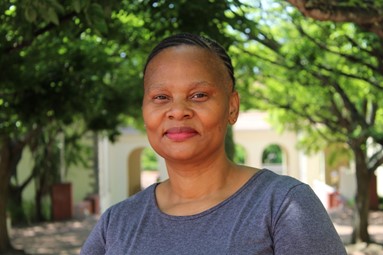By Atlegang Seoka and Thubelihle Mathonsi
As a young girl growing up in Pietermaritzburg, Lucky Xaba watched her grandmother welcome visitors with a soft smile and a soothing presence. She insisted that no guest should leave the house empty-handed. It never mattered who the guest was; they would always go home with something. Even on days when the pantry would be empty, her grandmother would extend a glass of water to her guests, saying, “Even if you have nothing, the least you can offer is water.”
Xaba absorbed it all and grew to understand that there is a quiet dignity in gifting.
Xaba is now the Humanities and Education Librarian at Rhodes University, and we have dragged ourselves up three flights of library stairs on a hot day to meet her. Her eyes light up as she recognises us, and she greets us with a composed smile: “Before we begin. I have some good news: LIASA approved my research paper!”
The Library and Information Association of South Africa (LIASA) is a professional body that advocates for the interests and development of librarians. The theme for this year’s conference was ‘Libraries in an age of democracy’, exploring through research the successes and failures of the country’s library services.
Xaba’s paper details a remarkable classroom library project she initiated in the Foundation Phase classroom of four local primary schools. She feels she has found her calling as an engaged librarian. But she says she never imagined herself as a librarian in her younger years.
It all started in her University of Kwazulu-Natal days when she pursued her Bachelor of Social Science degree, hoping to transition to Law. However, destiny had other plans when an unexpected opportunity arose, and she got a part-time position at the university library.
Her dedication grew as she spent her free time arranging books. Her supervisor recognised her potential and offered her a full-time position.
Her eyes soften as her thoughts drift between the past and the present. “I went to the Department of Library and Information Studies and told them I didn’t have money but wanted to study as a librarian.”
She found support and encouragement alongside success. Her distinguished academic performance earned her a place in the Master’s program. She’d spent countless days and nights poring over her books, increasing her chances of getting further financial assistance.
Xaba’s early career began in the quiet corridor of the Pietermaritzburg Legal Resources Centre but led her to the throbbing pulse of Johannesburg, where she worked at the High Court. In 2011, she joined the Rhodes University Law Faculty Library, and her children attended school in Makhanda.
However, 2013 delivered a painful blow: she had to move her children back to KwaZulu-Natal after her husband fell seriously ill. His death shocked her and forced her to return to her roots in KZN for a few months and then back to Johannesburg. However, after a call from a former colleague, she returned to Rhodes and made her mark in the Education Department’s Teachers Resource Centre.
Xaba is deeply worried about the reading performance of South African children. According to the Progress in International Reading Literacy Study (PIRLS Study), about 81% of grade 4 learners cannot read for meaning. “We are always underperforming when it comes to literacy,” she laments, her voice becomes gentler. For her, the literacy crisis stems from the institutional barriers that many kids, particularly those from the black community, must overcome to succeed.
This prompted her to take action. In September, she led a small parade of cars and visited four local primary schools. Children tapped their school shoes impatiently on the dusty ground and held colourful paper letters up to the motorcade, proudly spelling out SIYAFUNDISA eMAKHANDA.
At the centre was a bakkie overflowing with rugs, pillows, colourful shelves and books. Xaba stepped out of her car, her smile brighter than the morning sun. She and her Rhodes Library colleagues descended on a Grade 1 classroom, scattering plump and inviting cushions to create cosy reading nooks.
Xaba’s idea for Siyafudisa eMakhanda was born During a Mandela Day Drive at Duna Library in Joza. “We were donating school shoes, but something told me we should do more,” she says. At that point, she had already hosted workshops for local schools and began teaching them how to decorate their classrooms to create a fun and engaging learning environment. In her mind, having a well-decorated classroom without a reading corner at their disposal wouldn’t make sense.
The idea was that children would need books and cosy reading corners for their classrooms. Everything came together when a co-worker informed her that the SALI Trust would start accepting proposals for library projects. It was the missing piece.
With funding, Xaba’s idea of providing reading nooks with colourful shelves loaded with various children’s books evolved from an idea to a concrete reality at four primary schools: Makana Public Primary School, Grahamstown Adventist Primary School, Samuel Ntlebi and CM Vellum.
She hopes all schools in Makhanda will have a magical reading corner one day.


